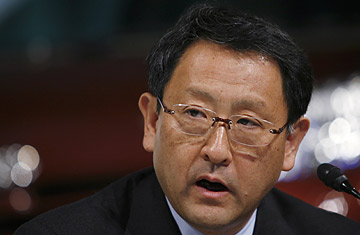
Toyota Motor Corp President Akio Toyoda
Facing an unprecedented slowdown in global car sales, Toyota Motor is trying something it hasn't done in 14 years: let a Toyoda family member take the top post as company president. Toyota management has tapped executive vice president Akio Toyoda — grandson of the company's founder, Kiichiro Toyoda — to take the helm and steer the company back to health. Having been groomed for the post and widely perceived to be the right man for the job, Toyoda, 52, will most likely be confirmed by Toyota shareholders in June, at which point he will inherit what is now the world's No. 1 carmaker at a critical juncture in the industry's history.
Toyoda, nicknamed Toyota's "prince" by Japanese media, has 24 years of experience at the company and became one of its youngest board members in 2000. When Katsuaki Watanabe became president in 2005, there was already talk circulating that Toyoda would be next in line. A law graduate of Tokyo's esteemed Keio University who holds an MBA from Babson College in Wellesley, Mass., Toyoda has extensive experience in the North American, Japanese and Chinese car markets. He also has firsthand experience with General Motors, having served as vice president at New United Motor Manufacturing, a California-based production joint venture between Toyota and GM. (See the top 10 cars from Detroit's Auto Show.)
Pedigree aside, some are questioning whether the company is making the right move by appointing an executive steeped in Toyota culture at a time when the global auto industry faces radical restructuring. Satoshi Hino, author of Inside the Mind of Toyota: Management Principles for Enduring Growth, says that Japan Inc.'s tradition of passing leadership duties along hereditary lines is out of favor — professional managers are often preferable because they carry less corporate baggage and are easier to hold accountable for missteps. "I don't think [Toyoda] would gather more centripetal force among employees because of his name," Hino says. "Toyota employees are rational people." Says Chris Richter, senior research analyst at CLSA, a Hong Kong-based brokerage house: "Good management requires good skill and good training and doesn't necessarily follow blood lines."
But Toyoda's track record shows he is a capable manager. And even before he officially takes over, he's signaling that he's willing to embrace change. Toyoda has already announced that he plans to replace most of the company's top management. "At the very least, [Toyota] wants to create the impression that they're going to shake things up, and maybe indeed they will," Richter says.
There may be little choice. Although Toyota just passed GM as the world's leading carmaker — the Japanese juggernaut outsold the stumbling Detroit giant by 620,000 vehicles in 2008 — Toyota recently projected an operating loss of $1.68 billion for the fiscal year ending March. It was the company's first loss in seven decades. Toyota's sales fell 4% in 2008 (GM's fell 11%), and the company is trying to adjust by temporarily suspending domestic production in February and March and by cutting production abroad as well. But plunging consumer demand is just part of the problem. Because the Japanese yen has been strong against the dollar and the euro, Toyota's cars are becoming relatively more expensive in the company's crucial export markets — which squeezes profit margins. Producing cars in yen and selling them for dollars or euros causes "a tremendous erosion of profit," says CLSA's Richter. "Automakers cannot profit from exported cars at current forex conditions," says Shinya Naruse, an analyst at Nomura Securities. "There is no way to recover without restructuring."
In other words, there will be no coronation when Toyoda takes over — there will be a trial by fire. But "Toyota has a history of rising to overcome crises," says Richter, pointing out Toyota's resilience during the oil shock in the 1970s and when the yen surged against the dollar in the 1980s. "I think it will be quite a few years before anyone could challenge Toyota's No. 1 spot."
— With reporting by Yuki Oda
